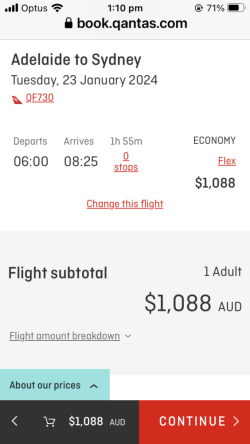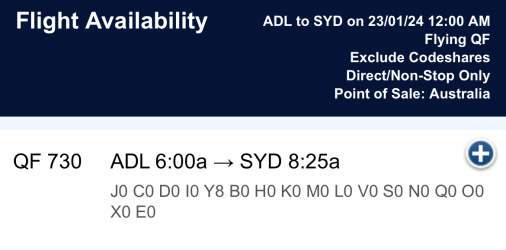so when you go and buy retail, you are paying more for higher quality
the same pair of jeans sells for different prices - granted there's sales periods - but you don't see 'auction' prices in retail
Sorry but this is a terribly flawed analogy in my view.
A seat on an aircraft service, train, or any other thing with limited availability with a set timeframe (eg concert, sports event etc) is very different to your standard retail item like jeans, a new phone or whatever.
If the retail outlet have pairs of Levis for sale they are considered more or less to be the same item. They don't have to be bought by a certain date(ie they won't expire or explode on Jan 21st at 4pm) and until a new design or something comes along, they're considered to be always available (ignoring stock shortages, being sold out etc) so yeah, they have a usually set price or sale price.
Events or transport or the like have set expiry dates (if they are not sold by the time of the service then they instantly go away). So the provider wants to sell them by that date or they are wasted (as opposed to a pair of jeans for example).
The legacy model, which just about everyone in the world follows, is dictated by demand and supply. Things like airline seats, train seats etc are a bit different to the sale of perishible goods like say bread or fruit (you know how you could go to the bakery near the end of the day and potentially get unsold items cheaper) - it doesn't work that way because of factors like airlines know that there are those who make last minute bookings for business and must fly, and well their job is to extract that higher yield (fairly or not, that's just the way it is).
this is why there are whole teams in departments named Revenue (or Yield) Management for airlines, hotels etc that determine the best mix of rates to offer or a specific service to sell as many seats as possible at the highest yield to the airline.
From a revenue point of view, it would be foolish to offer seats on the Tueday 6am flight at much lower levels if there's only a few left. Sure, they'd probably get happy campers grabbing those guys, but they clearly also feel there will be those last minute walk up business types who WILL pay that full Y pricing (corporates) - it may be unfair but that's the capitalist system we live in for better or worse.
yes, with pricing going up and down like a yo-yo.
they do maintain floor prices - a level which they never go below - so as to maintain "value" of the product experience.
I suppose its the difference between "buying an experience" service and buying a retail good.
so in the case of the hotel, its like you get given the exact same room, same size, differentiated by floor level in the building and thus access to unparalleled views
whilst on the airline you're talking row 4 v row 24 so the exact same "seat" located at different ends of the plane. (at the front, reminding you that just in front is a bigger seat with better meals and premium weine and champagne plus and first off exiting)
The hotels are a tad different, because they have many more product "types" they can offer (I mean for all but the most budget type places) - those higher floor rooms, better views etc are all considered upgrades on the basic product, and they have their own base point. Slightly different imo to economy seats on a 737 (and remember, a last minute full Y purchasing passenger on a very fill flight may actually only end up in 23E!). Each room type in a hotel has its OWN set of rates (or fare types if you like) for the room type (eg: standard, higher floor, ocean view, etc). that will fluctuate depending on the availability of those room types - the analogy to a flight would be more like "Economy, Economy with a wing view, Economy Aisle, Economy Window, Economy Forward Aisle, etc and so on. it's a slightly different situation in my view because hotels can differentite product far more than on a two class domestic flight.
















